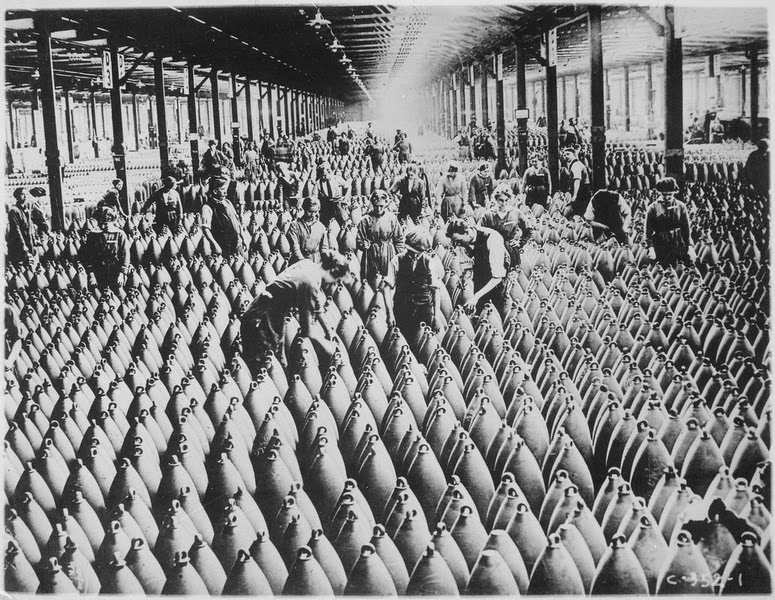Family
life and structure was completely changed by the First World War,
many married women found themselves forced to work by the death of
their husbands. Women were also drafted to work in industries
because the men were off fighting in the war. In fact around 200,000
women took up jobs in governmental departments for the first time and
something like 500,000 found themselves working in clerical
postilions in private offices and then there were all the women who
too working in agricultural type jobs but most women found themselves
working in munitions factories which was of course dangerous work.
In fact many more women did hard heavy work work the type of work
that no woman would be seen doing prior to the war.
In
some way the war gave so many women more independence for the first
time in their lives. Also the fact that the women could do the jobs
thought of as male only jobs and do the job well lead to change in
attitudes about what women could do and could not do.
After
the war ended over 8 million women were granted the right to vote and
in November 1918 the Eligibility of Women Act was passed which meant
women could now be elected as members of parliament. So there is no
doubt that World War 1 was the catalyst for women to be given the
vote, although it took another 10 years for women to be granted the
vote on equal terms with British men.
Of
course the were all the women who took a more active role in the war
by becoming cooks, stretcher bearers, motor car drivers and
interpreters, however governments did not allow this but it didn't
stop them doing those jobs anyway. A number of women's organisations
did become very active during the war, including the Australian
Women's National League, The Australian Red Cross and the Country
Women's Association just to name a few.
Nursing
was almost the only area of female contribution that involved the
women being at the front and experiencing the war. In Britain the
Queen Alexandra Royal Army Nursing Corps, First Aid Nursing Yeomanry
and the Voluntary Aid Detachment were all started before the war.
The Voluntary Aid Detachment were not allowed in the front line until
1915.
ore
than 12,000 women enlisted in the United States Navy and Marine Corps
during the First World War around 400 of which died during the war.
There
was close to 3,000 women in the Royal Canadian Army Medical Corps
during the war and it was during the war that the role of Canadian
women in the military first extended beyond nursing. Women were
trained in small arms, first aid and vehicle maintenance. Only 43
women in the Canadian military died during the war.
However,
things were different if you were a Russian woman as there were a few
Women's Battalions during 1917, these women fought well but failed to
provide the propaganda value and were disbanded at the end of the
year.
This
woman can't imagine being on the front line of war and feel that
these women must have been very brave.












I agree, the women were very strong and brave.
ReplyDeleteThey showed the men what they could do
DeleteExcellent post! Those Russian women, I'd wager, got the same respect from the higher-ups as the prisoner battalions did. The Russian battle strategy has always been, "Stuff more soldiers in there."
ReplyDeleteI am pleased you liked the post it is something I am interested in and didn't about those Russian women till I researched this post
DeleteWell done. Not enough has been said about women war heroes. They were all heroes in my book.
ReplyDeleteThank you I am pleased you liked the post
DeleteI think the second World War was more of a catalyst for changing the lives of American women than the first World War. America entered the Great War somewhat late, and a great deal of American energy--male and female--went into the flu pandemic. What do you mean by it took another ten years for Australian women to be granted the vote on equal terms with British men? Did a woman's vote not count the same as a man's? Thank you for all this excellent and interesting information.
ReplyDeleteLove,
Janie
Here in Australian women could vote from the late 1800's but it was different from state to state from what I could find out it was in the 1920's that women could vote in federal elections, I think I will have to do a bit more research on this and yes I thought it was WW11 that really changed things for women
DeleteThis is extremely well done, very interesting and I myself am very interested in both world wars and certainly the role of women in both. I read and study the topic frequently. xo
ReplyDeleteThank you I am really interested in these things and will be doing more of these types of post
Delete